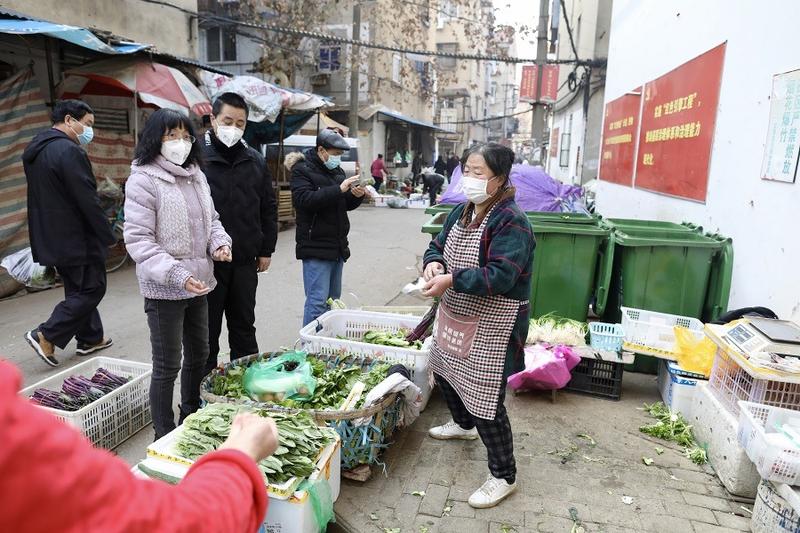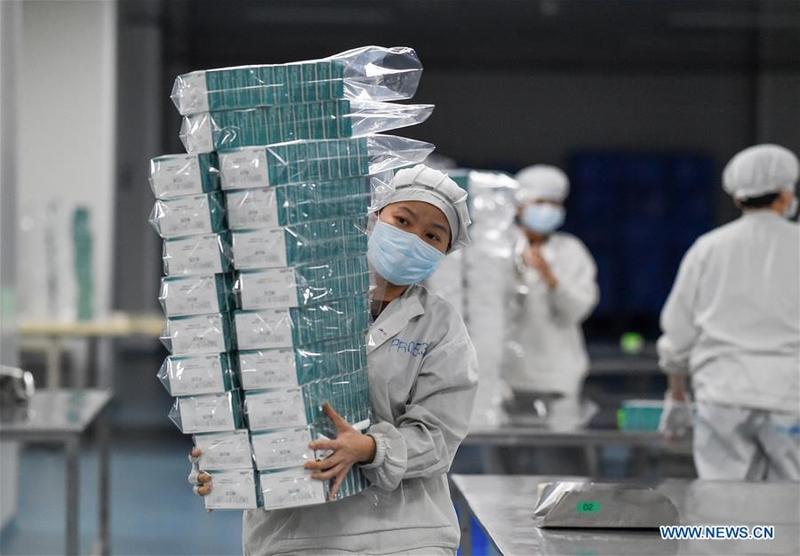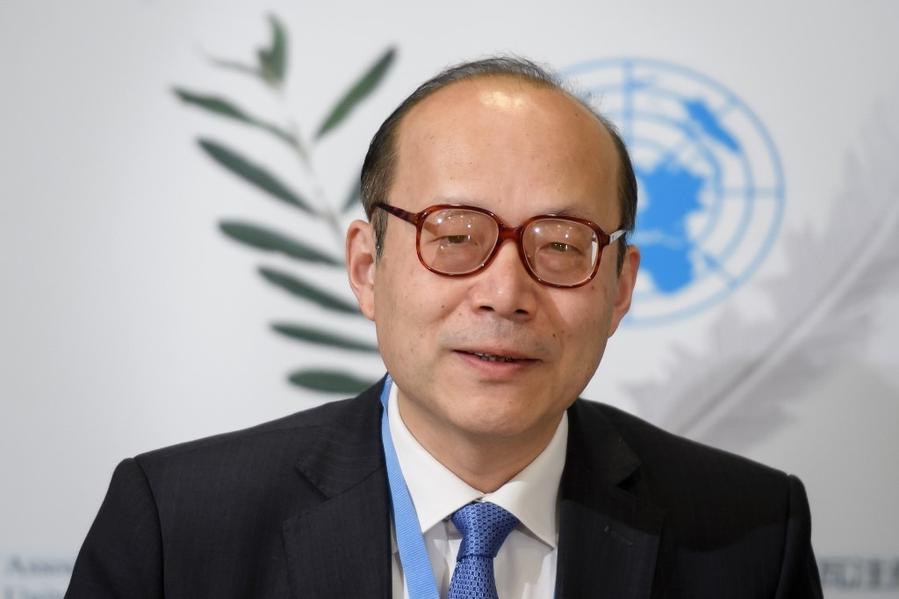 Residents buy vegetables at a makeshift stall at the Xincun sub-district in the Jiangan district of Wuhan, Central China's Hubei province, on Feb 4, 2020. (ZHU XINGXIN / CHINADAILY.COM.CN)
Residents buy vegetables at a makeshift stall at the Xincun sub-district in the Jiangan district of Wuhan, Central China's Hubei province, on Feb 4, 2020. (ZHU XINGXIN / CHINADAILY.COM.CN)
LONDON/GENEVA - The World Health Organization said Tuesday the deadly outbreak of the novel coronavirus does not constitute a "pandemic", as China's envoy to the UN in Geneva reiterated China's calls to heed WHO suggestions and refrain from stigmatization.
"Currently we are not in a pandemic, we are at a phase where we have an epidemic of coronavirus with multiple foci and we try to extinguish the transmission in each of these foci," said Sylvie Briand, director of global Infectious Hazard Preparedness at the WHO, at a briefing in Geneva.
Do not engage in over-reaction. You should follow WHO suggestions and refrain from restrictions on international travel or trade, stay clear of discriminatory actions and stigmatization.
Chen Xu, China’s ambassador to the UN in Geneva
The reason behind that judgment is that 78 percent of cases in China so far have come from Hubei province, the epicenter of the outbreak, with intense human-to-human transmission. Outside Hubei, there were "spillover" cases in which people were infected before the lockdown but having moved to other places across the country. There were also such "spillover" cases in 23 other countries where confirmed cases have been similarly reported.
Briand said that Chinese authorities have put in place "mitigation measures" to reduce the transmission outside Hubei, and have also been building hospitals to treat people and reduce the mortality rate.
READ MORE: Death rate from coronavirus pneumonia dropping
Meanwhile outside Hubei and in other countries, the current strategy is to stop the transmission of the virus so that there won't be a second Hubei scenario, which is why countries are implementing early case detection, early isolation and treatment of patients, contacts tracing, and social distancing measures in places of transmission risks. The WHO believes that the strategy will work, she added.
 A worker carries drugs at a pharmaceutical company in Haikou, south China's Hainan province, Feb 3, 2020. The workshop of a pharmaceutical company in Haikou has been working round the clock since Jan 20 to ensure the supply of drugs during the fight against the novel coronavirus outbreak. (PU XIAOXU / XINHUA)
A worker carries drugs at a pharmaceutical company in Haikou, south China's Hainan province, Feb 3, 2020. The workshop of a pharmaceutical company in Haikou has been working round the clock since Jan 20 to ensure the supply of drugs during the fight against the novel coronavirus outbreak. (PU XIAOXU / XINHUA)
Briand also stressed the importance in tackling misinformation and rumors surrounding the virus, as misinformation could hamper measures to combat the virus.
According to Briand, the WHO held a call conference Monday with over 50 representatives from large companies to discuss the coronavirus, a particular concern for companies with employees in different countries.
The WHO stressed the importance in tackling misinformation and rumors surrounding the virus, as misinformation could hamper measures to combat the virus
The WHO has targeted specific sectors, such as travel, tourism, food, agriculture, and also communities of health care workers through various international associations to provide tailored and trustworthy information about the outbreak.
Regarding repatriations from China, Briand said the WHO was coordinating with member states to come up with the best solutions for everyone.
ALSO READ: World leaders support China in fight against coronavirus
She noted that as it's the early stage of the outbreak, every country is quickly implementing measures according to their own experience with similar previous situations of transmission. She hoped that in the coming days member states could align their best practices.
 China's ambassador to the UN in Geneva Chen Xu briefs reporters after World Health Organization (WHO) declared the novel coronavirus outbreak a global health emergency, in Geneva, on Jan 31, 2020. (FABRICE COFFRINI / AFP)
China's ambassador to the UN in Geneva Chen Xu briefs reporters after World Health Organization (WHO) declared the novel coronavirus outbreak a global health emergency, in Geneva, on Jan 31, 2020. (FABRICE COFFRINI / AFP)
In Geneva, the WHO's chief urged all health ministers to improve data-sharing on coronavirus immediately and said he would send a team of international experts to work with Chinese counterparts.
The UN agency was sending masks, gloves, respirators and nearly 18,000 isolation gowns from its warehouses to some two dozen countries that need support, WHO Director-General Tedros Adhanom Ghebreyesus told its Executive Board.
The WHO's director-general urged all health ministers to improve data-sharing on coronavirus immediately
So far 22 nations have reported trade or travel-related measures linked to the coronavirus, which Tedros said should be “short in duration, proportionate to public health risks” and reviewed regularly.
“Such restrictions can have the effect of increasing fear and stigma with little public health benefit,” he said.
READ MORE: WHO declares outbreak global emergency, disfavors travel ban
Chen Xu, China’s ambassador to the UN in Geneva, told the WHO Executive Board that some restrictions went against the UN agency’s advice. He cited prohibitions on entry of foreigners who have visited China in the past 14 days, suspension of visa issuance and cancellation of flights.
“Do not engage in over-reaction,” Chen said. “You should follow WHO suggestions and refrain from restrictions on international travel or trade, stay clear of discriminatory actions and stigmatization.”
With inputs from Agencies


